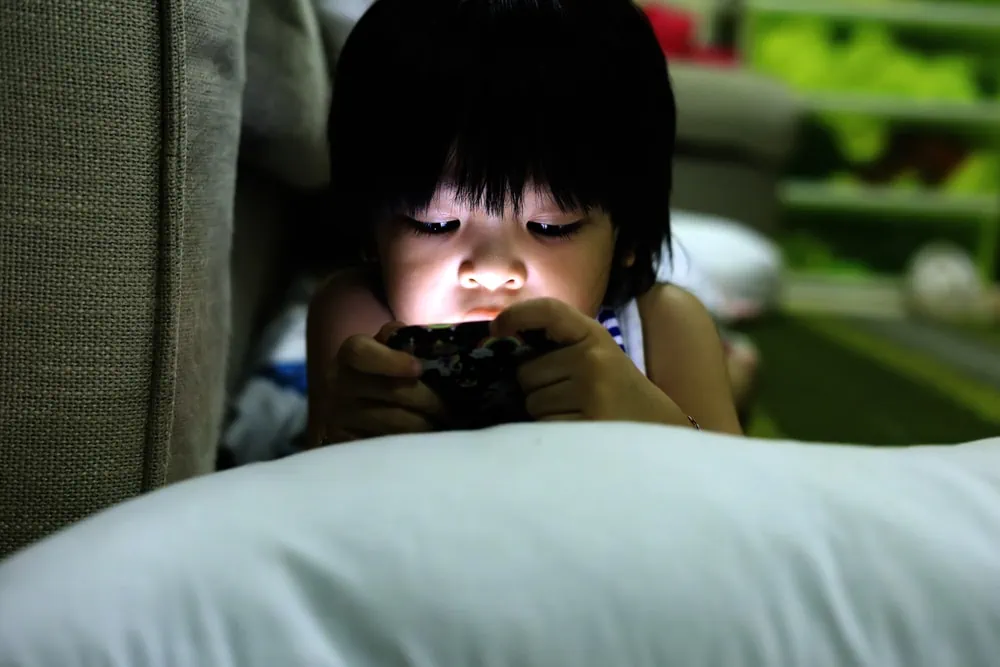Two new studies have added to the mountain of evidence for the negative impact of social media on kids’ health and well-being.
One, in Psychology of Popular Media, showed that limiting social media led emotionally distressed kids to feel better about their appearance and weight. Another, in PLOS Global Public Health, confirmed a relationship between social media use and eating disorders.
It’s not that social media directly affects body image in ways that can lead to disordered eating. Rather, the authors of the second study note, social media use may trigger “a self-perpetuating cycle of risk.”
Results highlight that social media is highly addictive, and individuals use it despite negative outcomes. In fact, to ‘fix’ their poor body image, users may be even more inclined to do so (e.g., manipulate photos to obtain more likes)—indicated by a hypothesised feedback loop. It is this which may trigger the self-perpetuating cycle of risk. However, this cycle can be broken. Several moderators, or buffers, that have the potential to disrupt it. Many studies showed that whilst individuals still internalised the ideal or compared themselves to others, high social media literacy and body appreciation prevented this from resulting in body image dissatisfaction, disordered pathology and poor mental health.
It’s all a potent reminder of just how important it is that we focus on nurturing kids’ “digital well-being” just as much as their physical, emotional, and social well-being. Such studies remind us that, without attention to this area, the others can suffer.
It’s Not Just Social Media
But while pundit after pundit weighs in on the social media issue, it’s crucial to recognize that social media alone isn’t the problem. As we noted in a post earlier this year, the recent spike in kids’ screen time is less from social media use and much more video watching and gaming of all kinds – not just violent games, although their content remains a real concern.

Why, you might ask, would someone get addicted if the developers prevent players from gaming as much as they like?
I have used the same mechanic in my own games, and this is how I explained it to my engineering team. Say I have a delicious chocolate cake. If I give you the entire cake, you might eat the whole thing in one go because it’s the best cake you ever had. But you likely will “overdose” and may not want to touch chocolate cake again. What if, instead, I give you a tiny slice each day? Gradually, you develop a daily habit, and you might end up buying 10 cakes from me.
That’s the ultimate goal: to build habit-forming games that have players coming back every day. In other words, it takes away the decision-making.
But it’s a goal he began to question a lot once his daughters became old enough to show interest in gaming themselves.
Of course, not every gamer will develop a true gaming addiction. One study cited by this game developer found that 10% of its teen subjects “developed pathological tendencies related to video games, including having difficulty stopping play.” They were also more prone to depression, aggression, anxiety, shyness, and problematic phone use.
Even then, we can ask: Is it the gaming itself? Or is it more that when screen time is unrestricted, there’s a strong tendency for it to displace other, more active behaviors? It’s well established that the more sedentary the lifestyle, the greater the risk of depression, anxiety, and other psychological distress in kids.
Understanding Technology’s Impact, Becoming Good Screen Time Mentors

To teach it well means understanding technology’s lure, its impact on developing minds, and how we can use that knowledge to guide children toward healthy screen use.
This was exactly why we were so pleased to collaborate with psychologist doreen dodgen-magee on a pair of courses for families, educators, and others who work with kids: How Families Can Moderate Their Technology Use and Technology: How It Shapes Our Brains, Relationships, and Sense of Self. Doreen is an expert in this area who has written two wonderful books on our relationships with our devices, each other, and ourselves: Deviced!: Balancing Life and Technology in a Digital World and Restart: Designing a Healthy Post-Pandemic Life.
Both courses are available on-demand, and taking either will also give you a 30% discount on Deviced!, along with additional resources to help you guide children toward healthy technology use. Here’s a taste of her compelling teaching style:






This article is very informative and highlights some important concerns regarding the impact of social media on kids’ health and well-being. It’s alarming to learn that social media use may trigger a self-perpetuating cycle of risk that can lead to disordered eating and poor mental health. The idea of nurturing kids’ “digital well-being” is a valid point, and it’s essential that we focus on this area just as much as their physical, emotional, and social well-being. I appreciate that the author acknowledges that social media alone is not the problem, and other factors like video watching and gaming can also contribute to the spike in kids’ screen time. It’s a reminder for parents and guardians to be vigilant and mindful of their children’s screen time habits and to set limits accordingly. Overall, this article is a great reminder of the importance of paying attention to kids’ overall well-being, and I’m grateful for the information shared.
Thank you for sharing this important article highlighting the negative impact of social media on children’s health and well-being. As a parent, I am increasingly concerned about the amount of time children spend on social media and the potential harm it can cause to their mental health and body image.
The studies you mentioned are concerning, but it’s reassuring to know that there are ways to disrupt the self-perpetuating cycle of risk associated with social media use. I am interested in learning more about the moderators or buffers that can prevent body image dissatisfaction and poor mental health in individuals who still internalize the ideal or compare themselves to others.
It’s also important to note that social media is not the only culprit when it comes to excessive screen time. Video watching and gaming are also major contributors to the recent spike in kids’ screen time. I appreciate the reminder that we need to focus on nurturing kids’ digital well-being, just as we do their physical, emotional, and social well-being.
Thank you again for sharing this informative article and for raising awareness about this important issue.